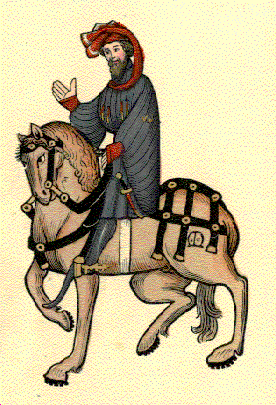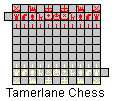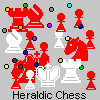Enjoying "The Knight's Tale",
by Geoffrey Chaucer
by Ed Friedlander, M.D.
Under Construction!
Warning: "The Knight's Tale" is not
a children's story. It presents a terrible vision
of the world. "The Knight's Tale" has shocked
readers from Chaucer's time to ours.
 The knight has always practiced "truth, honor, generousness,
and courtesy". He has been a successful fighter
and served with distinction in many campaigns. He is
wise, modest, and polite to everyone. By chance or
design, he draws the
lot to tell the first story, and does so graciously.
Later in the book, he emerges as the voice of reason,
common goodness, and
common sense, and is accepted by the rest of the pilgrims
as their moral authority.
The knight has always practiced "truth, honor, generousness,
and courtesy". He has been a successful fighter
and served with distinction in many campaigns. He is
wise, modest, and polite to everyone. By chance or
design, he draws the
lot to tell the first story, and does so graciously.
Later in the book, he emerges as the voice of reason,
common goodness, and
common sense, and is accepted by the rest of the pilgrims
as their moral authority.
The Story
Theseus, king of Athens, marries Hippolyta, an Amazon lady he has
defeated in battle. The king of neighboring Thebes (Creon) is a
tyrant who impiously forbade the burial of enemy dead. Theseus
marches on Thebes and defeats the tyrant. After the battle, he
condemns two prisoners of war, Arcite (arr-KEE-tay) and Palamon
to life in prison for no evident reason. I think perhaps this is for the sake of
the plot.
In prison, Arcite and Palamon both fall in love with Emily,
Hippolyta's sister -- they never meet her, but simply look at her from
their prison cell. Arcite is eventually released and returns
in disguise to court Emily. Then Palamon escapes from the prison.
The two men meet by accident in the woods.
They are fighting
viciously when Theseus finds them. He decides to let them
fight it out for Emily's hand in a public spectacle.
To prepare for the fight, Theseus builds an amphitheater with
shrines to Mars (god of war), Venus (goddess of romantic love), and
Diana (goddess of hunting, the moon, and
the single life). Arcite prays to Mars, asking to
win the battle. Palamon prays to Venus, asking to marry Emily.
Each man is given a premonition that his wish will be granted.
Emily prays to Diana, asking not to be forced to marry either man.
The god Saturn tells the other gods that he has a plan by which both Mars
and Venus (and as the story goes, Diana as well) can grant the prayers of their supplicants.
Arcite wins the battle, but then his horse throws him and
his chest is crushed. Dying, he wishes Palamon to wed Emily.
Theseus says that in a world of blind luck ("Fortune") and
much sadness, we should try to find happiness and to love
each other when we can. Palamon and Emily are married and
live out their days in complete married happiness.
The Issues
The story comes from a tale by Boccaccio, and it includes
philosophical musings on fortune, the power of the stars
(astrology) and predestination in general, etc., etc.
Medievalists talk about what category of work "The Knight's
Tale" represents. You can find plenty of this in the links.
There will be more of this here when the site is complete.
The Gods
But there is something more to "The Knight's Tale."
Did you notice?
Here is what is represented
in the Temple of Venus, Goddess of Love.
- sleeplessness, sighs, sad songs, and everything else that
happens to those who "suffer love"
- allegorical figures including lasciviousness (sex for its
own sake), largesse (wasting your money looking for sex),
philtres (have you heard of today's "date rape pill"?),
force (rape itself), falsehood, flattery, extravagance,
intrigue, and jealousy (with a gold crown, and a cuckoo,
symbol of adultery), and idleness (as a teacher, I've seen
how grades often plummet when a student enters into a
"relationship")
- Narcissus gave up his life from falling in love with
his own reflection; this was a punishment inflicted by
Venus for his refusing to gratify a woman who loved him;
- Medea murdered her rival and her own two children to get
back at their father
- Solomon's wives led him away from God's service
- Circe turned men into pigs
- In the Aenead, Turnus's sexual jealousy leads to his nation's ruin in war, and his own death and damnation
- Ask your classics professor about Croesus. It's in keeping with Chaucer's theme that rich king Croesus
once called himself perhaps the most fortunate person alive --
andsoon after his son was
killed in a wreck, his wife commited suicide, and he was (perhaps) burned
alive.
- These and thousands of
other people are depicted as captured in Venus's
noose, crying out for help in vain. (Been there, done that -- Ed.)
Here is what is represented in the Temple of Mars, God of War:
- A forest without people or animals, with the ground
quaking and rumbling, as in a post-nuclear holocaust
scenario
- Premeditations of violence by criminals, kings, and more criminals
- Fake friends with concealed weapons,
murder of people who are asleep
- A suicide "with all his heart's blood matted in his hair"
- A nail driven into a person's forehead for torture and
execution (this was used both by the Viet Cong and by Ferdinand
Marcos, and surely others)
- Allegorical figures of mental illness, armed uprisings, and others
- Dead bodies, their throats cut, in the undergrowth
- A warlord-tyrant looting and raping
- A flattened city, ships on fire crashing into each other
- An unlucky hunter being killed by bears
- "A sow munching a baby in its cradle" (!)
- A road fatality (yesterday's cart-operator might be killed
just as today's driver)
- The allegorical figure of Conquest, under the sword of Damocles,
suspended above his head by a hair, ready to kill him unexpectedly
at any time.
- Julius Caesar's murder, Mark Antony's suicide, and so forth, with
a comment that this is predestined in the stars
- Finally the allegorical figure of Mars himself, eating a
man
Here is what is depicted in the temple of Diana
- Several characters from mythology who were killed by
Diana for no good reason. Actaeon merely had the bad luck
to see her using the toilet. She turned him into a deer
and he was eaten by his own dogs.
- A woman crying out for help in childbirth, which was
often fatal in ancient and medieval times.
- The statue of Diana shows her other roles as
goddess of hunting, goddess of the moon, and goddess
of black magic and of the dismal underworld (as Hecate).
Here is how old Saturn, earth-god,
eldest and most powerful of the gods,
describes his portfolio:
- drownings
- prisoners in dungeons
- both the neck and the noose that strangles it
- serf uprisings (these were always lose-lose situations)
- secret hatreds and secret poisonings
- buildings collapsing and killing people
- fatal disease, and the sensation of cold that goes with
the approach of death
Do you see a pattern? I thought you would.
What the Knight Could Not Say Openly
To discern the knight's intent in telling the story, we need to
do as we usually would, and look for material in the text which
does not really further the plot or please the readers. The knight
reveals his own mind twice. First, there are the scenes of
unmitigated horror in the three temples. Second, there is the
passage at the death of Arcite:
His spirit changes its house and went away
Where I came never -- where I cannot say,
And so am silent. I am no divine
Souls are not mentioned in this tale of mine.
I offer no opinion. I can tell
You nothing, though some have written where they dwell.
It is Theseus who built the temples, showing the terrible things
in the world. Theseus ends the story with his own
philosophical musings, beginning at line 2987. The creator
(Theseus speaks in non-Christian classical language)
bound the things that make up the world in "the fair chain of love."
Theseus speaks of "this wretched world below", where
everything must die, and even the stones on which we walk will
end. He is not speaking from reading or doctrine, but from life
experience. Theseus perhaps did not coin the phrase, "Make a virtue of necessity",
(which appears here), but urges people to "take well what we may not escape",
without complaining, and to try to maintain one's good reputation.
Especially, when one has the opportunity to be happy, take it.
He urges Emily and Palamon to marry (and make of two sorrows, one joy).
Here is my paraphrase:
When the Creator made "the fair chain of love", the created world,
it was a great work, well-intended, and He must have His reasons.
He established order for the physical world. And in this "wretched
world below", everything has a time when it must die, even though mishaps
may make death happen sooner. We all know this from observation.
It must be that the Creator is perfect, but what has descended downward
in nature is corruptible, and endures only by one thing succeeding another.
This applies to the oak trees and even the stones, the rivers and towns.
And of course all people must die. We must think that all things return
to the Creator. So "make a virtue of necessity", don't complain about
being mortal, and try to live bravely. Arcite died in his prime,
with a good reputation, rather than eventually becoming a has-been
in this "foul prison" we call life.
Let us find what happiness that we can. Emily, would you
consider making Palamon and yourself happy? He loves you.
And Palamon, I know you want this... will you take Emily's hand?"
The knight has travelled around his world, and seen a great deal.
For Chaucer's knight, the universe (even though a remote
God seems to have created it) is not friendly to human beings. It
seems to be at
best indifferent, and at worst actively hostile. Everything dies.
We must try to live good lives,
and do what we can to be happy.
We enjoy more freedom of, and from, religion than Chaucer's
pilgrims did. In Theseus's famous "fair chain of love" speech,
the king offers the Boethian hope that there is some benevolent
plan behind the horror and unfairness of the universe. Yet still, the
best we can do is to try to live
a good life. Today's secular humanists talk openly about
humankind standing alone in a godless universe. For such people,
the challenge is to live wisely and well, to do good,
and to love one another. Some keep up some form of religious
observance out of deference to the feelings of their neighbors.
I do not know whether the knight is speaking for Chaucer, but
I am confident that Chaucer painted him from real life.
Chaucer admired and cited Boethius elsewhere, so you'll need to
decide this for yourself.
People often notice that Chaucer's pilgrims present a cross-section of
his countryfolk. The knight is struggling to live a good life
although (or perhaps because) he no longer believes in the
comforts of conventional religion.
To include this page in a bibliography, you may use this format:
Friedlander ER (1999) Enjoying "The Knight's Tale" by Geoffrey Chaucer Retrieved Dec. 25, 2003 from http://www.pathguy.com/kttale.htm
For Modern Language Association sticklers, the name of the site itself
is "The Pathlogy Guy" and the Sponsoring Institution or Organization
is Ed Friedlander MD.
Links
The Knight's Tale
Chaucer Resources
Boethius
Susan
Crane -- a much more reasonable women's perspective on "The Knight's
Tale"
Julian of Norwich
La Belle Dame Sans Merci
The Lady of Shalott
Moby Dick
Oedipus the King
Prometheus Bound
The Book of Thel
The Seven Against Thebes
The Tyger
Timbuctoo
 I'm Ed. I'm an MD, a
pathologist in Kansas City,
a mainstream Christian.
a modernist, a
skydiver, an adventure gamer,
the world's busiest free
internet physician,
and a man who still
enjoys books and ideas.
I'm Ed. I'm an MD, a
pathologist in Kansas City,
a mainstream Christian.
a modernist, a
skydiver, an adventure gamer,
the world's busiest free
internet physician,
and a man who still
enjoys books and ideas.
I hope you like The Knight's Tale, and that I've been of some help.
Visit my home page
Belief in God -- I do not share
"The Knight's Tale"'s dark vision, but understand why others do.
E-mail me
|
|
New visitors to www.pathguy.com
reset Jan. 30, 2005: |
Teens: Work hard in school and/or your trade.
The best thing anybody can say about you is, "That kid works too
hard, he/she isn't taking it easy like
the other young people." Health and friendship.


Try one of Ed's chess-with-a-difference java applets!
 The knight has always practiced "truth, honor, generousness,
and courtesy". He has been a successful fighter
and served with distinction in many campaigns. He is
wise, modest, and polite to everyone. By chance or
design, he draws the
lot to tell the first story, and does so graciously.
Later in the book, he emerges as the voice of reason,
common goodness, and
common sense, and is accepted by the rest of the pilgrims
as their moral authority.
The knight has always practiced "truth, honor, generousness,
and courtesy". He has been a successful fighter
and served with distinction in many campaigns. He is
wise, modest, and polite to everyone. By chance or
design, he draws the
lot to tell the first story, and does so graciously.
Later in the book, he emerges as the voice of reason,
common goodness, and
common sense, and is accepted by the rest of the pilgrims
as their moral authority.
 I'm Ed. I'm an MD, a
I'm Ed. I'm an MD, a
























